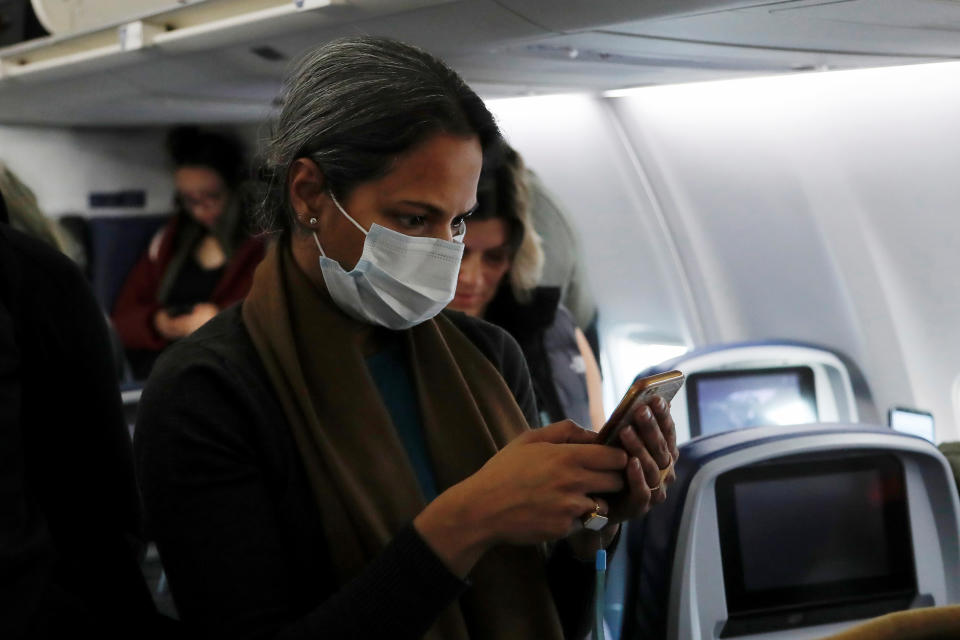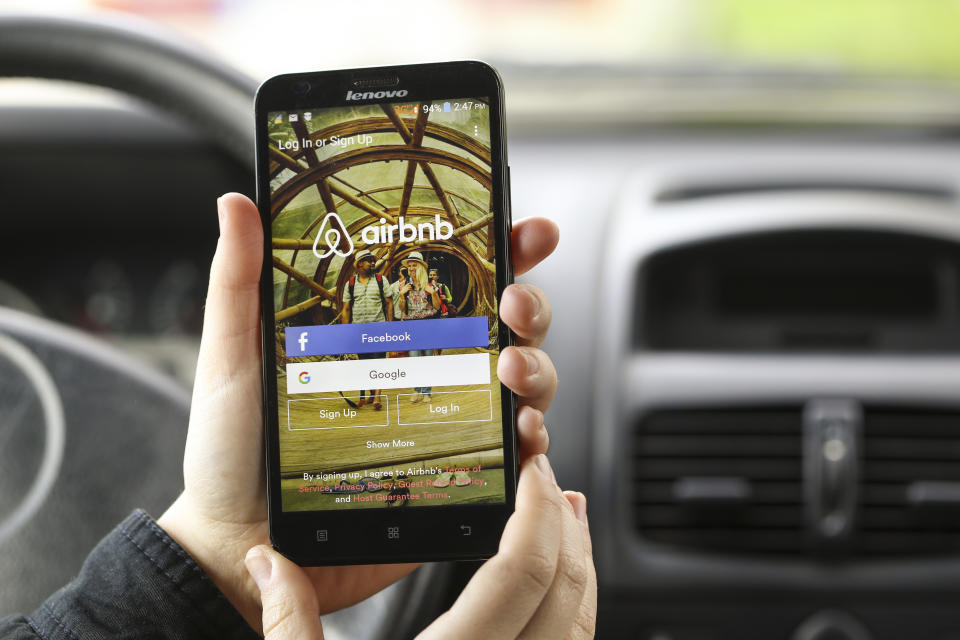Americans need to start canceling travel to slow down the coronavirus: epidemiologist

Consumers already booked for travel as the new coronavirus transmits across the globe may be feeling pinched if faced with a calculation to either go through with their plans, or lose their investments. As a result, companies offering no or few rebooking options may be enabling the virus’ spread, especially for those traveling to high-risk areas like New York or Washington state.
Many airlines, hotels, cruise lines and third party travel booking platforms are rolling out special refund and rescheduling policies, with U.S. air carriers like Delta Air Lines (DAL), American Airlines (AAL), and United Airlines (UAL) waiving flight-change fees. However, popular third-party booking platforms Airbnb and Vrbo are offering consumers only limited opportunities to cancel their reservations without paying a penalty.
The Centers for Disease Control and Prevention (CDC) recently updated its guidance for traveling within the U.S., warning that being in “close contact” with others could increase the risk for exposure to the new coronavirus, or COVID-19. An expert whose work is dedicated to studying the spread of infectious diseases suggested that travel could increase one’s chances of contracting the virus.
“The part that has an impact is the number of people that you contact, per day. So if you double that [number], you are going to double your chances of getting the virus. If you've cut it in half, you're going to cut your chances of getting the virus in half,” epidemiologist Maciej Boni, an associate professor of biology at Penn State University, told Yahoo Finance this week. “Of course when you do travel, if you're going to an airport, if you’re driving from one city to another city, normally that involves an increase in contacts.”
‘A trickle-down effect’
But that risk hasn’t stopped the travel industry from trying to get people to keep going on trips. A group of 150 travel-related entities sought to assuage traveler fears in a statement published Tuesday by the non-profit U.S. Travel Association, which lobbies on behalf of the industry.
"Though the headlines may be worrisome, experts continue to say the overall coronavirus risk in the U.S. remains low,” the statement’s signatories said, acknowledging that older individuals and those with underlying health conditions do face higher risk. “The decision to cancel travel and events has a trickle-down effect that threatens to harm the U.S. economy, from locally owned hotels, restaurants, travel advisors and tour operators to the service and frontline employees who make up the backbone of the travel industry and the American economy.”
For his part, Boni says he disagrees with that statement, even though it acknowledges that people over 60 face a higher risk for contracting the virus.
“They acknowledge that there's risk over 60s, but one of the ways of reducing risk to over 60s is to reduce risk to everybody, including the under 60s, so that the under 60s don’t infect the 60s,” Boni said, referencing the popular hashtag #flattenthecurve. “If you slow down an epidemic, you flatten the epidemic curve. The way that you slow it down is by canceling NBA games, and canceling birthday parties, and canceling some vacations.”

In a subsequent statement Thursday morning, the U.S. Travel Association responded to the Trump Administration’s decision to ban certain incoming travel from Europe, saying, "Temporarily shutting off travel from Europe is going to exacerbate the already-heavy impact of coronavirus on the travel industry and the 15.7 million Americans whose jobs depend on travel.” The group called on the federal government to consider aggressive steps to protect workers and employers, including those who rely on the travel industry for income.
Responding to the suggestion that travel may be exacerbating the spread of the virus, the U.S. Travel Association told Yahoo Finance it was following the guidance of federal health agencies including the CDC, the U.S. Department of Health and Human Services, and the U.S. Department of Homeland Security.
But Boni said he disagrees with the Travel Association’s suggestion that travel for younger populations is low-risk. People, regardless of their age, have a responsibility to avoid travel if it would increase the likelihood of contaminating themselves or others, according to Boni.
For perspective, Boni points out that he’s worked on emerging diseases for 20 years, including swine flu, H5N1avian flu, and H7N9 avian flu. “I've worked on all of these diseases since 1997. None of us panicked and this time it's really not a drill. This is really an emergency,” he said.
Here’s what companies are offering for canceled trips
In light of the emergency, some travel companies are trying to accomodate customers who want to cancel their trips. U.S. carriers Delta Air Lines, American Airlines, and United Airlines are waiving flight change fees and permitting customers who booked flights between specific timeframes to use fare payments toward future travel. Southwest Airlines (LUV), which does not charge flight change fees, is also permitting ticket holders who do not wish to travel during the outbreak to use the funds paid for a future trip.
American Airlines and United Airlines also placed caps on U.S.-Europe fares in response to President Donald Trump’s recent travel restrictions on many European countries.
Third party booking platforms such as Airbnb, and Vrbo, a subsidiary of Expedia Group (EXPE) that operates major booking platforms Hotels.com, Orbitz, Travelocity, have also issued policies allowing customers and hosts limited opportunities to cancel.

On Friday, Airbnb updated its policy to allows guests in the U.S. to cancel some reservations without charge. The policy also applies to bookings in Mainland China, South Korea and Italy. No-fee cancellations for U.S. bookings are available for reservations made on or before March 13, 2020 so long as the check-in date was set to begin April 1, 2020 or earlier.
A prior policy, issued Tuesday, permitted guests under government- or health authority-mandated travel restrictions to cancel reservations without charge. The company has stopped short of offering all booked guests a charge-free cancellation option, leaving remaining decisions up to accomodation hosts. In efforts to encourage hosts to provide greater flexibility, the company offered to waive the 3% fee it charges to hosts on new reservations, on bookings through June 1, 2020.
“In the case of COVID-19, where travel restrictions have been put in place by governments or health authorities, our extenuating circumstances policy allows guests to cancel eligible reservations without charge, and the host is required to refund the reservation, irrespective of the previously contracted cancellation policy,” Airbnb said in its updated policy. Guests holding Airbnb bookings for March 10 to June 1, 2020 who are not eligible for a refund of the guest service fee are being offered a travel coupon that can be used on a future Airbnb booking.
Airbnb’s competitor Vrbo is leaving an even broader range of bookings up to the original terms of guest bookings. In a statement on the company’s website, Vrbo said, “Refunds of payments made for vacation home rentals are based on the homeowner’s cancellation policy. If a homeowner or property manager refunds a booking due to COVID-19 (coronavirus) concerns, Vrbo will automatically refund the traveler service fee.”
Expedia Group did not respond to Yahoo Finance’s request to learn more about Vrbo’s revised cancellation policy. However, Boni suggested economists shouldn’t focus too much on cost when determining whether people should cancel trips.
“There's a time and a place for cost-benefit analyses, but not when your house is on fire. When your house is on fire the fireman removes everybody from the house, and they put out the fire. They don't have a water meter attached to the fire hydrant to see when the water expenditures increase over the value of your house,” he said. “We can all recover from these economic costs, but we cannot recover from premature death. That's the one thing that we don't get back.”
This story was updated to include Airbnb’s amended cancellation policy issued Friday, March 13.
Alexis Keenan is a reporter for Yahoo Finance. Follow her on Twitter @alexiskweed.
Read more:
‘Never seen anything like this’: Bookings for overseas flights from US plummet
Coronavirus has spurred an ‘unprecedented’ wave of US flight cancellatons, analyst says
Airline CEOs warn coronavirus is cutting into reservations and are prepared for it to get worse
Coronavirus and travel: What you need to know
Follow Yahoo Finance on Twitter, Facebook, Instagram, Flipboard, LinkedIn, YouTube, and Reddit.

 Yahoo Finance
Yahoo Finance 